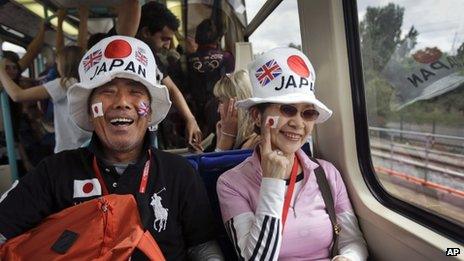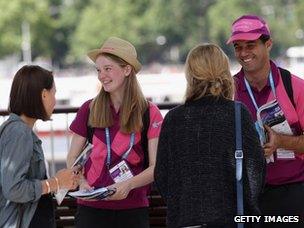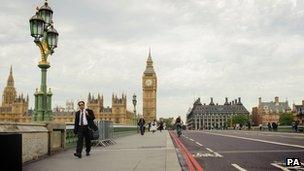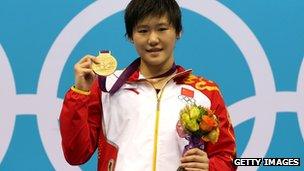What the world thinks of London 2012
- Published

Many commentators noted the jubilant spirit of visiting Olympic fans
As the London Olympics enters its last few days, how has the world's media been assessing this two-week festival of sport? What image of London and the UK is being presented overseas?
Russia will host the next winter Olympics in Sochi, and a cheerful correspondent in the left-leaning daily Trud was impressed by the "romantic megalopolis" that is London, although not by its culinary standards.
"Today's London is the most sporting and the most fashionable city, which gets the most mentions in global media. It has the attention of the entire planet. If you're not there yet, buy your tickets right away. Sure, you won't make it to the Olympics, but you can still make the most of this romantic megalopolis.
"The average Londoner doesn't make a big deal about food - feeding the kids chips, pizza, toast and sandwiches, and themselves opting for fast and poor-tasting fish and chips, pizza and sandwiches. We cannot even begin to imagine what would happen to Londoners and city visitors if it wasn't for Chinese and Indian takeaways."

London 2012 volunteers earned high marks for being friendly and courteous
Columnist Ori Ozan in Israel's liberal daily Ha'aretz was almost too kind.
"The week I had in London was enough for me to fall in love with the Brits. Before I arrived, I thought that they were arrogant, irritating and naive. I was right only in relation to naive and this also worked in my favour (helped me get better seats in the games). Everything here worked perfectly, the thousands of volunteers are courteous and nice... entering and leaving the Olympic sites is orderly. Their immense love of sport and sportsmen and the huge investment in the run-up to the games paid off. Now they are reaping the fruit (the exception is football of course; there they continue to lose in the penalty kicks)."
And Ed Odeven in the Japan Times was buoyed by the prevailing sense of humour.
"People watching is one of the most enjoyable aspects of being in England during the 2012 Summer Olympics. Wherever you look, there are new faces and interesting places, and the volunteers and security guards are trying to have fun with all the crowds. They are using humour to cope with all the lines [queues]. Humour is helping the lines seem less intimidating, too."
However, Ukraine's Den and Ukrayina Moloda complained about what they saw as biased refereeing, especially in boxing.

Journalists took note of the unusually empty streets in central London
Like many foreign media observers, India's Economic Times wondered about the economic benefits and where the people have gone.
"Empty roads and restaurants, plummeting hotel room prices and peaceful airports during the London Olympic Games marks a watershed in perception about the world's greatest sporting event. While it certainly draws millions of TV viewers, a big assertion convincingly disproved is that staging the Olympics boosts tourism for the host nation."
And the Indian Express cannot keep cricket out of the equation.
"Londoners can't stop smiling. The sun has been a regular at most Games venues. Team GB has recorded a personal best, and equally delightful for the locals has been their famous foe Australia's unexpected slump. On the day Great Britain touched its all-time high with 22 golds, the world-renowned sporting country down under was on a dismal five, and not in the top 10."
Chinese frustration
With a vast medal haul to be proud of, the Chinese media have plenty to write about, but some commentators were disappointed by perceived rough handling of Chinese prowess, particularly of the young swimmer Ye Shiwen, whose blistering efforts in the pool surprised many pundits.
The Chinese media generally admired the good-natured sporting spirit of the British public in supporting their athletes regardless of whether they won gold or not. But harsher Chinese critics said this was the most poorly organised Olympics in recent times in terms of mishaps and glitches.
"Insufficient funds, inadequate training, sloppy management - why the constant own-goals at the London Olympic Games?" asked Shanghai's Jiefang Ribao daily.

Chinese media was disappointed by perceived unfair treatment of gold medal winner Ye Shiwen
Taiwan is competing as Chinese Taipei, and Liu Shih-chung saw the Games as an ideological success for the UK.
He said thoughtfully in the Taipei Times: "The UK might not be as powerful and prosperous as it once was, but through a transformation of its foreign policy, the country has succeeded in using the Olympics as a platform to promote its ideals internationally. The London Games are a major political and foreign policy achievement for the UK and that is something it would serve Taiwan well to learn from," he said.
Spectre of riots
Meanwhile, Iran's Press TV reminded viewers about the rioting in London a year ago.
Reporter Nargess Moballeghi said that the killing of Mark Duggan by police led to the anger spilling over into "rioting and looting". A year on, this is the London Britain "wants you to see" she said of a cheerful young woman with a British flag tattoo on her face - "united and proud as it hosts the Olympic Games".
But the official Iranian Students News Agency was more positive, saying the London Olympics was "the greenest event compared to all previous Olympics, since eco-friendly equipment and systems have been used".
Olympic official Kim Jin-sun said in South Korean newspaper JoongAng Daily that London was upholding the "quintessential history and tradition" of the Games.
"The city is filled with a jubilant crowd enjoying momentary relief from a challenging economic situation weighing on the European continent as well as other parts of the world. The British government opted for the organisation to practise the Olympic spirit of fairness. The stadiums and fields in London have been constructed to emphasise the British style and nature of practising austerity and practicality in a dignified manner," he said.
But Russian pole vaulter and bronze medallist Yelena Isinbayeva told RBK TV that people in Britain were not interested in the Olympics. She told the TV: "If you leave the premises of the Olympic village, you get an impression that nothing is happening. Many people do not understand what the Olympic Games are and whether they are held in their city. There is no feeling of jubilation there."
BBC Monitoring, external selects and translates news from radio, television, press, news agencies and the internet from 150 countries in more than 70 languages. It is based in Caversham, UK, and has several bureaux abroad. For more reports from BBC Monitoring, click here